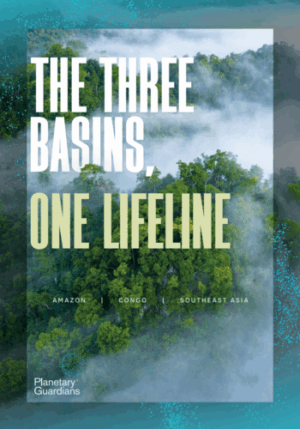A new report from the Planetary Guardians, developed by Systemiq, reveals that protecting the world’s three great rainforest regions is not just an environmental mission. It is a macroeconomic necessity and a matter of human security.
Together, the Amazon, Congo, and Southeast Asia basins sustain the planet’s climate, regulate rainfall and underpin global food systems. The report Three Basins, One Lifeline warns that over 50% of global food production and up to 8% of global GDP is at risk by 2050 without urgent action, with economic losses exceeding US$1 trillion annually from crop failures and shortages. Tropical commodities such as coffee, cacao and others are heavily dependent on rainforest landscapes, with price volatility exceeding 100%, due to abnormal rainfall.
A global call to safeguard the Amazon, Congo, and Southeast Asia basins
The Three Basins hold 80% of the world’s remaining rainforests and two-thirds of its land biodiversity, yet only one-third of their original forest cover remains intact. These ecosystems absorb over 300 billion tonnes of carbon, stabilise rainfall across continents, and supply freshwater for half of global food production.
Unchecked deforestation threatens to unravel this delicate balance. Extreme weather, water scarcity, food shortages, and economic instability are accelerating and compounding risks – and the world’s poorest communities are on the frontlines.
Reframing forests as an economic asset
The report reframes forest protection as a core investment in global economic resilience, not an optional act of environmental charity, and gives governments, investors and development banks the evidence and tools they need to act.
Avoided deforestation is among the most cost-effective climate solutions available, delivering over 40% of low-cost emissions reductions at just US$20–50 per tonne of CO₂, seven to ten times cheaper than reforestation.
Treating forest protection as essential infrastructure
The report calls for urgent and coordinated investment in nature as a form of global infrastructure. Key recommendations include:
- Investing in the Tropical Forest Forever Facility (TFFF) – a US$125 billion blended finance mechanism providing long-term, results-based payments to rainforest nations
- Reforming budgets and subsidies to align national spending with forest protection
- Scaling innovative finance tools such as green bonds and debt-for-nature swaps
- Embedding natural capital in GDP frameworks to reflect the true value of living ecosystems
- Empowering Indigenous Peoples and local communities as the most effective rainforest stewards
The report was launched at New York Climate week alongside the Planetary Health Check 2025 and shows that the tools and finance to protect the planet’s rainforests already exist. What’s needed now is leadership and global cooperation.


